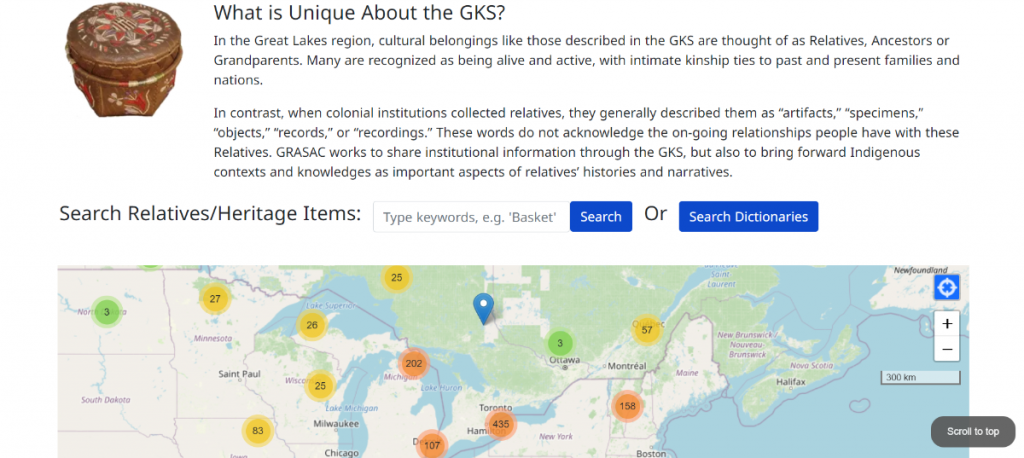By Cara Krmpotich

We are excited to announce that GRASAC’s redesigned Knowledge Sharing Platform will be launching later this month.
Anyone will be able to search the GKS without needing to login. We hope this makes the GKS more accessible and relevant to Indigenous artists, youth, scholars, curators and language learners. We also hope this makes it easier for teachers to use the GKS in the classroom. We have designed new ways to search that are more user friendly, including a map that connects cultural belongings with their place of origin. GRASAC members with a login will be able to save searches and create project folders to meet their needs. Your existing login and password will still work.
We started this journey to a public website more than five years ago. In 2018, GRASAC Elders and artists raised the need for people in their communities to be able to benefit from the images and information contained in the GKS. Although this might sound like an easy task, it’s taken years to raise the funds, hire computer programmers and designers, re-visit our agreements with cultural institutions, re-design the GKS with public users in mind, and honour the relationships between Great Lakes nations, their cultural belongings and languages.
We will look forward to your feedback as you explore the new site—both in terms of how the website works, but also the information we share about each item. We welcome conversations about the new GKS with GRASAC members in Indigenous communities, museums and/or universities.
The GKS has always sought to be a digital space in which Indigenous knowledges are valued. Over the coming years we will continue to develop the GKS in this way. The GKS currently hosts two dictionaries, in Cayuga and Anishinaabemowin. We look forward to adding more. We have also built the revised GKS with multi-lingual capabilities, so that menus and labels will also be available in those languages in the years to come. Over the next five years, GRASAC will be revisiting each record in the GKS, guided by Great Lakes ethics and understandings of relatedness inclusive of human kin, plant and animal relations, and other political relations.
Heidi and Cara would like to thank Drupal developer Victor Tarcenco and IT Manager Priya Murugaiah; Project Manager Bradley Clements; Digital Heritage & User-Experience Consultant Richard Laurin; and User-Experience testers Jarrett, Brian, Panni, Joanna, Natasha, April, Tiziana, Connor and Shamina. Funding for the GKS redevelopment is provided by the University of Toronto’s Faculty of Arts and Science, the Faculty of Information, the Critical Digital Humanities Institute, and the Social Sciences and Humanities Research Council of Canada. We are grateful for the contributions of all our supporters and partners.
Stay tuned for further details and the launch date!
